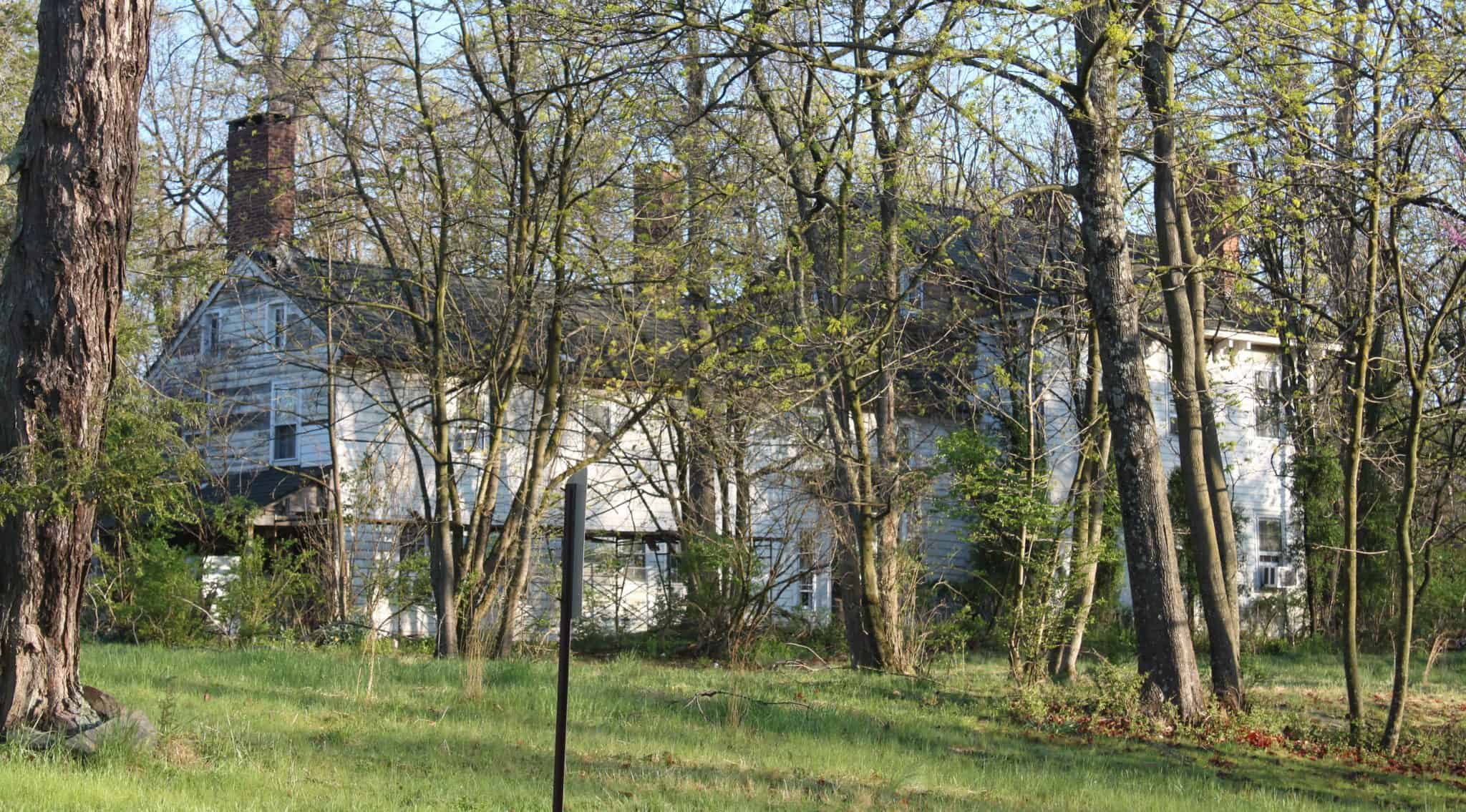The owner of a house that is the earliest one built in Princeton is being sued by the Municipality of Princeton for failing to make repairs to the 339-year-old house, in violation of an agreement between the owner and the town.
At the center of the dispute is the Greenland-Brinson-Gulick House at 1082 Princeton-Kingston Road, near the corner of River Road. The house is historically significant because it was built by Henry Greenland in 1683. The earliest part of the house is hidden behind the Victorian bay window in the middle section of the house.
The house, which has been expanded several times, was acquired by Major John Gulick in 1797 and has remained in the Gulick family for 225 years. Gulick fought in the American Revolutionary War and the Whiskey Rebellion, and is buried in the nearby Kingston Presbyterian Church cemetery.
Benjamin Gulick and his wife, Jeanette Gulick, who are the present owners of the house, agreed to sell 28 acres of the 40-acre property to the former Princeton Township for $2.7 million for parkland and preservation purposes.
The deal, which was reached in 2002, called for Benjamin Gulick to use some of the money to restore the house and outbuildings, including a barn, a carriage house and a smoke house. He was appointed account manager and construction manager/supervisor.
Fast-forward nearly 20 years, and no repairs appear to have been made to the house. It has not been painted and the decorative trim over the front door is missing. Scaffolding has been in place for many years in front of one wing of the house.
The outbuildings have continued to deteriorate. Some siding on the barn is missing and the landscaping is overgrown. A fallen tree remains propped up against another tree, where it had landed.
Now, after reported repeated pleas with Gulick to spend the money to make repairs, Princeton officials are suing him to force him to make those repairs. The lawsuit, which names Gulick and his wife as the defendants, was filed in Mercer County Superior Court in October 2021.
The deal between Princeton Township and Gulick called for setting aside $600,000 in a restoration account to pay for the restoration and/or preservation of the house and outbuildings, according to the lawsuit.
Gulick was named to be an account manager and the construction manager/supervisor for the project. He was required to complete the restoration within 24 months of the issuance of the first building permit, and to complete work on the outbuildings 18 months later, the lawsuit said.
As an account manager, Gulick was required to use his “best efforts to see that the work was completed within five years from the date the proceeds for restoration” were received by the account managers, the lawsuit said.
Gulick filed a detailed farmhouse restoration plan with the Princeton Historic Preservation Commission, which was approved by the commission in 2004. However, Gulick “has done very little” to implement the plan since it was approved, the lawsuit said.
The town’s Historic Preservation Officer reached out to Gulick over the years and also visited the property to review the restoration work under way. Gulick did not respond to the Historic Preservation Officer, and visits to the farm revealed little work had been made, the lawsuit said.
In June 2019, Gulick met with the Princeton Historic Preservation Commission chairman, the Historic Preservation Officer and the municipal attorney to discuss the project. Gulick agreed to a new timeline to complete the project.
At the meeting, Gulick acknowledged that $130,000 was left of the $600,000 that had been set aside for the restoration work. He said he had used the money for other purposes, such as paying property taxes, the lawsuit said.
Also at the June 2019 meeting, Gulick agreed to sell a portion of the remaining farmland to a family member or to list it with a Realtor. The lot, which has a current estimated value of $450,000, was created at the time of the sale of the land to then-Princeton Township in 2002.
Gulick agreed to use the money from the sale of the lot toward the restoration project, but when Municipal Attorney Edwin Schmierer followed up a few months later in September 2019, he did not respond, according to allegations. The lot apparently was not listed for sale, and he did not take steps to carry out any of the actions that he had agreed to do at the June meeting.
Schmierer contacted Gulick in November 2019 and told him that if he did not follow through on the actions that he had earlier agreed to do, the town would file a lawsuit. Gulick did not respond, and in April 2020, Schmierer told him that if he did not take steps to restore the house within six months, a lawsuit would be filed, according to reports.
The lawsuit to enforce the agreement, which was filed in October 2021, states that over nearly 20 years, Gulick had “intentionally ignored” town officials’ requests for status updates on the project and how the money was being spent.
“Gulick’s failure to respond or undertake the required restoration is particularly troubling because he has dissipated the restoration funds from $600,000 to approximately $130,000 while the farmhouse and outbuildings continue to deteriorate,” the lawsuit said.
“Gulick is unwilling to follow through with the approved restoration plan (and) agreement, and significant restoration funds have been spent without any visible improvement to the farmhouse and outbuildings,” the lawsuit said.
The lawsuit seeks to remove Gulick from his roles as account manager and construction manager/supervisor, and to create a trust for the remaining money in the restoration account.
The lawsuit also seeks a detailed accounting of how he spend the money, and to require him to sell the farm lot to replenish the restoration account.

